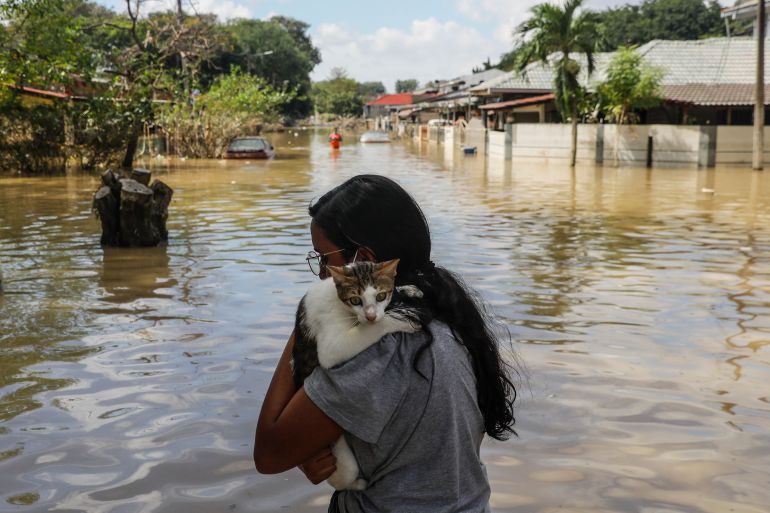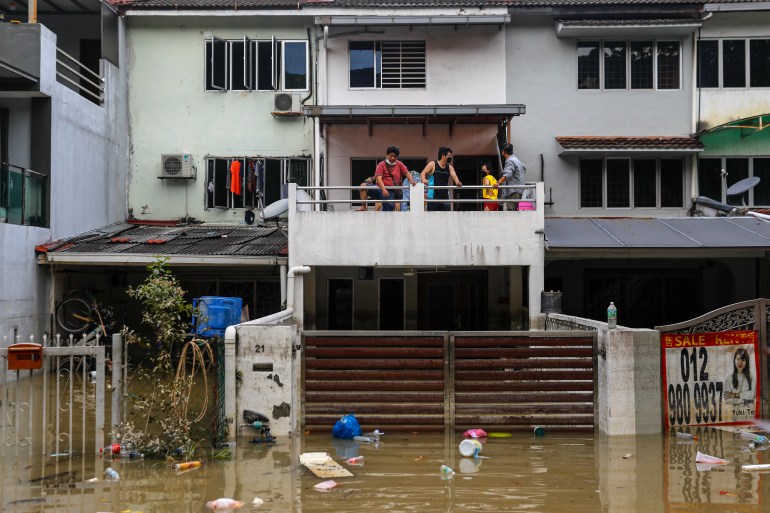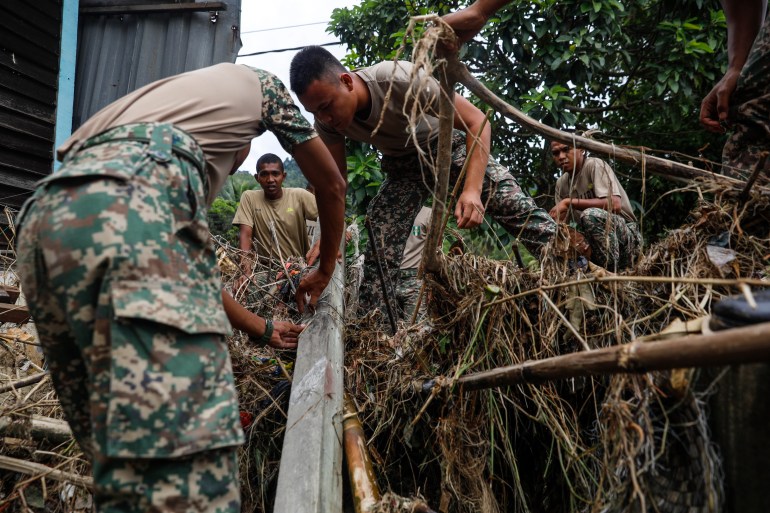‘Here to serve’: Floods put Malaysia youth party in spotlight
Newly-registered Muda joins rush of volunteers to help thousands affected by devastating floods amid sluggish official response.

Kuala Lumpur, Malaysia – Malaysia’s worst flooding in a decade claimed 54 lives and left more than 70,000 people without a home in seven states across the southeast Asian nation after torrential rains, worsened by climate change, in December and early January.
The western states, including the capital, Kuala Lumpur, and the wealthy state of Selangor, were worst hit after a month’s worth of rain fell in a single day, but some seven states across the country were affected.
Keep reading
list of 4 itemsDeath toll from Malaysia’s worst floods in years rises to 27
Eight killed in Malaysia floods amid criticism of rescue efforts
Floods in Malaysia displace more than 21,000 after heavy rains
Faced with what appeared to be a sluggish official response, Malaysians rushed to help each other out.
On Twitter, hashtags like #DaruratBanjir (Flood Emergency) and #KerajaanPembunuh (Murderous Government) started trending.
Flood evacuee Amin Mohamad told Al Jazeera there was no sign of the government agencies who were supposed to help, and his family was rescued by a group of volunteers in kayaks.
“There were no warnings, we did not have time to pack anything. We just went to high ground and waited for help but no one came,” said the resident of Shah Alam, Selangor’s capital. “Thankfully, several kayakers came in the early hours of the morning.”

The floods were the worst since December 2014 when at least 21 people were killed, and then Prime Minister Najib Razak was criticised for taking too long to return from a golfing holiday in Hawaii and deal with the disaster.
This time it was Ismail Sabri, the country’s third prime minister since 2018, who came under fire over his Perikatan Nasional government’s slow response. It was 36 hours before the authorities deployed search and rescue missions to flood-hit areas and provided those affected with basic supplies such as food.
‘Spontaneous’
In Taman Sri Muda, a hard-hit neighbourhood of Shah Alam, groups of kayakers organised themselves to lead an operation to rescue families stuck on the roofs of their homes, as the nearby river burst its banks and water levels rose to at least one metre.
Twenty-two-year-old Adib Harith rallied a group of 20 people to help out with eight kayaks and small boats after he saw a tweet about a stranded family who was in urgent need of medical aid.
“It was a spontaneous event. I saw someone had tweeted that her family was stranded and they were asking for someone to rescue them as they had someone ill,” he said, adding his team rescued close to 200 people in December.
Several gurdwaras or Sikh temples around the capital also mobilised, with volunteers cooking hot food for flood-hit families and distributing supplies around the country.
Vice President of Gurdwara Sahib Petaling Jaya, Jasbir Kaur, said the temple started relief operations on December 19 with volunteers from all walks of life helping out.
“Nothing was planned, it was Malaysians who came together to rally behind the victims with the purpose to feed and help out anyone who was affected by the flood,” she told Al Jazeera.
9.1.2021 | GSPJ volunteers continued their challenging journey to serve the flood hit victims. This clip shows the aid delivered to Chenor, Pahang.
We will be sharing more video’s on the how the aid was distributed & the volunteers challenges.
Please RT. Follow our FB & INSTA pic.twitter.com/EIjIKD627Z
— Gurdwara Sahib Petaling Jaya (@gurdwarasahibpj) January 9, 2022
Among the groups of volunteers who went above and beyond were many young Malaysians.
“It was a hair-raising experience. We have the youth that came in thousands, not only the Sikh youth but all young people around Klang Valley,” Jasbir said, referring to the area including Kuala Lumpur and Shah Alam, which is home to about 8 million people.
But while the ruling parties were left wanting, the disaster provided an opportunity for the recently-registered youth-based political party, Muda, to show its mettle.
Former Youth and Sports Minister Syed Saddiq, who is Muda’s president, was on the ground with the party’s volunteers and helped with rescue operations.
He shared his experiences on social media.
“We cannot afford to wait for the authorities when people are starving and waiting for help to arrive. When we went down to the major affected areas, we could hear the sound of people asking for help in total darkness. The victims were stranded on top of their roofs for days waiting for help,” he told Al Jazeera in an interview.
Muda managed to raise $520,000 in cash for its flood relief activities channelling the money into logistics, cleaning supplies and provisions for the affected. The party aims to give 300 of the poorest families some $71 each, and to distribute school supplies and replacements for electrical goods such as fridges and cookers that were destroyed by the floodwaters.
‘Bigger than branding’
Muda co-founder Dr Thanussha Francis Xavier says the floods highlighted the need for the government to improve its disaster response, with the National Disaster Management Agency (NADMA) and the state government both seen as slow to act in response to the crisis.
After the criticism, Prime Minister Ismail pledged $335m in flood aid and assistance to victims, including $2,000 to the next of kin for those who lost their lives.
“To this day, it remains vague as to who is leading the coordination of the crisis. It was unacceptable for NADMA to have washed their hands of the responsibility of managing the crisis and yet face no consequences for it,” she told Al Jazeera.
A fortnight later, the clean-up drive is continuing with damaged furniture and mounds of rubbish piled up on the streets in the worst-affected areas.

Analysts say political rivalries may have compounded the problem.
NADMA falls under the PN-led federal government, while Selangor is governed by Pakatan Harapan, a rival coalition.
“Like it or not, disaster management or the government’s response to a natural disaster is political,” BowerGroupAsia Director Adib Zalkapli told Al Jazeera. “To score points, politicians have to bring life back to normalcy for the flood victims, and the competition among politicians is intense especially in Selangor given the state is a Pakatan stronghold.”
Amid the perceived government inaction, Muda used social media to source funds, volunteers, 4×4 vehicles and boats.
“This was bigger and deeper than any political strategy or branding,” said Dr Thanussha, who is also the party vice president. “We were driven by the realisation that people would go hungry for another day if we didn’t act quickly. Helping those in need especially during a crisis should be everyone’s brand of politics.”
The floods come as Malaysia prepares for elections, which are due by May 2023, but are expected to be held as soon as this year.
With 18-year-olds allowed to vote for the first time – a law championed by Syed Saddiq when he was in office – the fight is on to win the hearts and minds of the country’s young people. The move means an estimated 3.8 million more people will be able to participate in the election (the electorate was 14.9 million at the last vote in 2018).
Analysts say that while not all young people have the same vision for the country or commitment to democratic reform – indeed they appear to be as divided as the older generations – they have grown up in an era of a more vibrant and engaged civil society.
“Youth are still critically important to political change, beyond short-term electoral fluctuations, especially in cultivating new political sensibilities and initiatives pitched to influence not just their peers, but also society as a whole,” Meredith Weiss, an expert on Malaysian politics, wrote in a paper this month for Singapore’s S Rajaratnam School of International Studies.
“Youth alone cannot rescue or revive a faltering Malaysian democracy. But they are playing key roles towards that end, such that Malaysia emerges over time better positioned for democratised governance, as rising cohorts expect more than the illiberal status quo.”
@syedsaddiq Im the midst of volunteering, we tried to have a little fun in between. Volunteerism is fun. Be part fun. Be part of MUDA. #fyp ♬ original sound – Hi
Muda’s flood response attracted the authorities’ attention.
Police said they would investigate volunteers who went down to flood relief areas without securing prior approval, while a smear campaign emerged on social media, with several videos shared of alleged Muda members drinking and partying in an attempt to discredit the party.
Muda has denied the allegations and Syed Saddiq says he hopes the commitment demonstrated by the party during the floods will be seen as an example of how politics can be different.
The 29-year-old, who represents the small southern town of Muar in Parliament, hopes the party can show a new approach to politics in a multi-ethnic country where some political parties base their membership solely on race, and where politicians of all stripes have often resorted to race and religion to win support.
“Muda gravitates towards nation building and we are solely focused on solving the national issues. We are here to serve all Malaysians regardless of race and religion, which is why there are no restrictions to joining the party. Securing power through religion and sentiments will only endanger the country’s harmony,” Syed said.